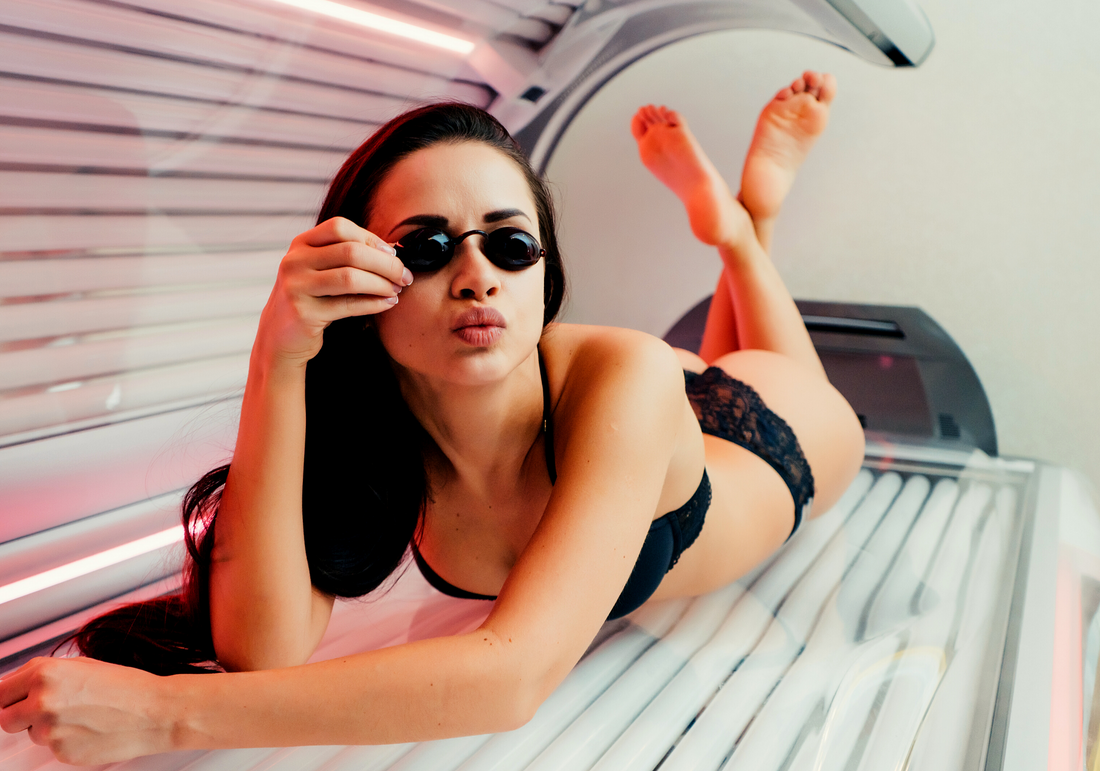
Ochrona oczu, twarzy i znamion w solarium. Część 1 - oczy
Share
Od kiedy 6 czerwca ponownie możemy cieszyć się możliwością powrotu na solaria, czyli w ulubione miejsca nas wszystkich, w których możemy używać naszych cudownych produktów, otrzymujemy bardzo dużo pytań od osób, które jeszcze nigdy nie korzystały z tej możliwości upiększenia swojej karnacji skóry.
Pośród naturalnych pytań nowicjuszy, które kłębiły się w głowie nas wszystkich, kiedy pierwszy raz wchodziliśmy do zaczarowanej kabiny opalającej, by po kilku minutach wyjść z niej odmienionymi i szczęśliwszymi, są również takie kwestie, które powtarzają się nader często. A brzmią one następująco:
- Czy idąc na solarium muszę chronić twarz/oczy/znamiona?
- W jaki sposób mam chronić wrażliwe części swojego ciała?
- Czy ochrona jest zależna od czasu, na jaki wybieram się do kabiny?
- Co się stanie, jeśli nie zasłonie tych części ciała?
Na rynku jesteśmy znani z tego, że wsłuchujemy się w prośby i sugestie naszych klientów, (ba! Przecież to właśnie Wy, Wasze pomysły i potrzeby, są dla nas główną inspiracją!) postanowiliśmy napisać zbiorczą serię artykułów, które powinny odpowiedzieć na Wasze pytania. Przed Wami pierwszy z nich – ochrona oczu!
A gdy już wszystkie wątpliwości będą w końcu rozwiane – wtedy przyjdzie czas na rozkoszowanie się cudowną opalenizną uzyskaną z pomocą produktów Onyx <3

„Jeszcze nigdy nie opalałem się w okularach, zawsze z zamkniętymi oczami, mało tego - często je otwieram i sobie patrzę jak wyglądam w promieniach UV i do tej pory żyje, widzę (całkiem dobrze) i nigdy nic sobie nie oparzyłem.”
Internet pełen jest takich opinii. No właśnie, ale czy to, że komuś się nic nie stało (albo po prostu jeszcze się nie stało), daje nam usprawiedliwienie do tego, żeby zachowywać się nieodpowiedzialnie?
Skóra na powiekach jest najcieńsza niż na całym ciele i bardzo łatwo ją poparzyć. Mamy nadzieję, że obowiązek noszenia okularów lub nakładek na oczy, podczas opalania w solarium, jest dla Was, podobnie jak dla nas, faktem niezaprzeczalnym.
DZIAŁANIA NIEPOŻĄDANE – POWIKŁANIA
W wielu poradniach i przychodniach niestety bardzo często możemy się spotkać z pacjentami, którzy nie zastosowali się do zaleceń wykwalifikowanego personelu solarium. Jeżeli nie zadbamy o odpowiednią ochronę oczu, możemy być niestety narażeni na wiele powikłań, takich jak:
- Fotorektoza
- Zaburzenia widzenia (zamglone spojrzenie)
- Łzawienie oczu
- Uczucie, jakby do środka oczu dostał nam się piasek (takie wrażenie może wynikać z fragmentów uszkodzonej rogówki, które pozostały w gałce ocznej)
- Poparzenie skóry wokół oczu i samych powiek
- Zapalenie spojówek (będzie objawiać się przekrwieniem, pieczeniem i silnym łzawieniem)
- Przyspieszony rozwój zaćmy
- Zapalenie rogówki
Musimy pamiętać o tym, że ludzkie oko nie posiada możliwości samoistnego stworzenia komórek melaniny, przez co nie może chronić się przed promieniowaniem, tak jak np. skóra.
Biorąc pod uwagę wszystkie wymienione powikłania (a wymieniliśmy tylko niektóre z nich) możemy dostrzec, jak ważne jest odpowiednie zabezpieczenie oczu podczas opalania w solarium

"ZAMYKANIE OCZU NIE WYSTARCZY?”
Zdecydowanie nie, nie zagwarantuje to wystarczającej ochrony naszym oczom. Ludzka powieka zatrzymuje jedynie ok. 25% promieniowania – reszta dociera do oka i może skutkować nie tylko samymi podrażnieniami, ale nawet zwiększyć ryzyko poważniejszych uszkodzeń.
BIAŁE PLAMY WOKÓŁ OCZU
Wiele osób nie korzysta z okularów lub nakładek w solarium, ze względu na to, że boi się białych plam dookoła oczu – tzw. efektu pandy.
Pierwszą zasadą w tym przypadku jest dokładne zmycie makijażu. Część Waszych kosmetyków sama w sobie zawiera filtry UV. W takim przypadku niedokładne pozbycie się ich może powodować niechciane plamy na skórze.
Drugą zasadą jest dobre dopasowanie i ułożenie okularów, czy nakładek na twarzy. Należy to zrobić w taki sposób, by poza powiekami znalazło się jak najmniej skóry – wtedy zminimalizujemy możliwość powstania plam.
ZAKRYWANIE TWARZY RĘCZNIKIEM
Przecież jeżeli przykryjemy czymś twarz, to ochronimy już oczy, prawda? Ręcznik położony na wybranej części ciała, zmniejszy promieniowanie tylko o 5 SPF. Oznacza to, że nawet umieszczenie materiału na twarzy, w dalszym ciągu będzie zbyt małą ochroną dla naszych oczu.

„NO DOBRZE, ALE MAM OKULARY PRZECIWSŁONECZNE”
Nie wspominając oczywiście o tym, iż ślady po nieopalonych okularach przeciwsłonecznych nie będą dobrze wyglądać na twarzy, jest ważniejsza kwestia, którą trzeba poruszyć w tym miejscu.
Okulary przeciwsłoneczne, jak sama nazwa wskazuje, z założenia powinny chronić przed promieniami słonecznymi, a nie przed światłem lampy UV. Jej promieniowanie rozchodzi się w zupełnie inny sposób, a co za tym idzie – niechciane promienie mogą dostać nam się do oka, a stąd już tylko parę kroków do powikłań, o których pisaliśmy wcześniej.
Warto mieć przy sobie jednak okulary przeciwsłoneczne ponieważ, zaleca się (jeśli na dworze jest bardzo słonecznie) założenie okularów bezpośrednio po wyjściu z solarium. Oczy po sesji opalania mogą być „nadwyrężone” oraz przewrażliwione – nie da się przecież w całości uniknąć kontaktu ze światłem lamp.

CO Z SOCZEWKAMI?
Jeżeli mimo wszystkich obiekcji, zdecydujemy się jednak na nieposiadanie okularów podczas opalania, soczewki kontaktowe bezapelacyjnie muszą być zdjęte. Zwłaszcza, iż soczewka kontaktowa komplikuje obieg krwi w gałce ocznej, a także dostęp do niej powietrza – utrudnia to naszym oczom walkę z podrażnieniami, co w efekcie może wpłynąć negatywnie na nasze oczy.
Pamiętajmy o tym, że nawet jeśli posiadamy soczewki z filtrem, w dalszym ciągu chroni to tylko środową część oka, nie zabezpiecza już niestety pozostałej części gałki ocznej i okolicy oczu.
Warto pójść jednak za głosem rozsądku i zabezpieczyć oczy okularami w solarium. Są na to dwa sposoby:
- Zdejmujemy soczewki, zakładamy okulary – wtedy jesteśmy 100% bezpieczni- Nie zdejmujemy soczewek, zakładamy okulary – w tym przypadku należy pamiętać o tym, żeby zakroplić oko nawilżającym płynem bezpośrednio przed, jak i po opalaniu. Stały obieg suchego i gorącego powietrza w kabinie może wysuszyć soczewkę i podrażnić nam oko.

OKULARY
Często spotykamy się z pytaniami czy przeźroczyste okulary również będą chronić przed promieniowaniem? Odpowiedź na to pytanie brzmi: zdecydowanie tak. Kolor nie ma wpływu na działanie ochronne okularów.
Musimy jednak pamiętać o tym, by trzymać okulary w sterylnym miejscu (nie musi to być sterylność, jak w szpitalu, wystarczy zwykłe opakowanie lub woreczek), a także o regularnym czyszczeniu ich (UWAGA: nie zalecamy wyparzania, wkładania do gorącej wody, czy mikrofalówki – plastik, z którego są stworzone, może ulec zniekształceniu i stracić swoje właściwości). Wkładanie okularów bezpośrednio do torby, czy plecaka, zwiększa ryzyko dostania się do nich bakterii, które tylko czekają, żeby wygrzać się w solaryjnym ciepełku i wejść do naszego oka, powodując podrażnienie, czy inne powikłania.
